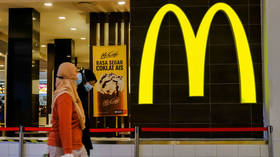
The fast-food giant is facing a boycott in Muslim countries over its perceived support for the Jewish state amid the mass killing of Palestinians in Gaza
Russian Market is a project by a financial blogger, Swiss journalist and political commentator based in Zurich. Follow him on X @runews

© Getty Images / SOPA Images / Contributor
McDonald’s Corporation is confronting a substantial business downturn in multiple Middle Eastern markets and beyond, owing to an escalating controversy stemming from its perceived support of Israel amid the country’s ongoing war with Hamas. According to Palestinian statistics, since October 7, 2023, over 22,000 Palestinians have lost their lives throughout Israel’s shelling of Gaza. Most were reportedly civilians.
McDonald’s CEO Chris Kempczinski recently disclosed that the company is witnessing a “meaningful business impact” in the wake of widespread customer boycotts, fueling concerns over the fast-food giant’s regional and global operations.
Kempczinski wrote in a blog post on LinkedIn: “Several markets in the Middle East and some outside the region are experiencing a meaningful business impact due to the war and associated misinformation that is affecting brands like McDonald’s. This is disheartening and ill-founded. In every country where we operate, including in Muslim countries, McDonald’s is proudly represented by local owner operators who work tirelessly to serve and support their communities while employing thousands of their fellow citizens.”
Thousands across the world are boycotting Starbucks after it sued its workers union for expressing Palestinian support and solidarity and condemning Israel. But Starbucks isn’t alone, McDonalds, Coca Cola, Puma and even Disney are other companies called to boycott. pic.twitter.com/yWZilXCqT8
— AJ+ (@ajplus) November 10, 2023
The catalyst for this setback lies in the dissemination of images and videos across social media platforms, revealing McDonald’s franchise stores in Israel providing complimentary meals to members of the Israeli military. The resultant public outcry has given rise to spontaneous boycotts, with consumers in the Middle East and other Muslim-majority nations such as Saudi Arabia, Malaysia, and Pakistan, expressing their discontent and calling for a boycott of the iconic burger chain.
🔴⚡ [ FLASH INFO ] LE BOYCOTT FONCTIONNE TRÈS BIEN : Le PDG de McDonald's, Chris Kempczinski, a déclaré que la société reconnaît que plusieurs marchés du Moyen-Orient et même certains en dehors de la région "subissent un impact commercial significatif en raison de la guerre" à… pic.twitter.com/7wOBSIJ0JT
— 𓂆 🇵🇸 Gaza News+ (@GazaNewsPlus) January 4, 2024
Kempczinski acknowledged the severity of the situation, citing the impact on various markets in the Middle East and beyond. While he decried the “disheartening and ill-founded” nature of the boycotts, he notably refrained from providing specific details regarding the scale of the business impact. With approximately 2,000 McDonald’s restaurants in the region, the repercussions are substantial, underscoring the challenges faced by multinational corporations in navigating geopolitically charged conflicts.
The McDonald’s scenario is not isolated, as major Western brands, including Starbucks and Unilever, find themselves entangled in similar controversies due to their perceived alignments in the Israel-Palestine conflict. The complexities of managing public perception and business interests in the face of such politically sensitive issues have proven to be formidable for these global entities.
JUST IN: McDonald's CEO says that 'several markets in the Middle East and some outside the region are experiencing a meaningful business impact due to the war and associated misinformation'. pic.twitter.com/WQrsemkXsm
— The Spectator Index (@spectatorindex) January 4, 2024
Despite the boycotts and the subsequent geopolitical tensions, both McDonald’s and Starbucks have reported positive global sales figures. McDonald’s, notably, reported a 10.9% increase in Q4 2023, defying expectations of a more significant downturn. This resilience underscores the nuanced interplay between global brand image and regional controversies.
For more stories on economy & finance visit RT’s business section




